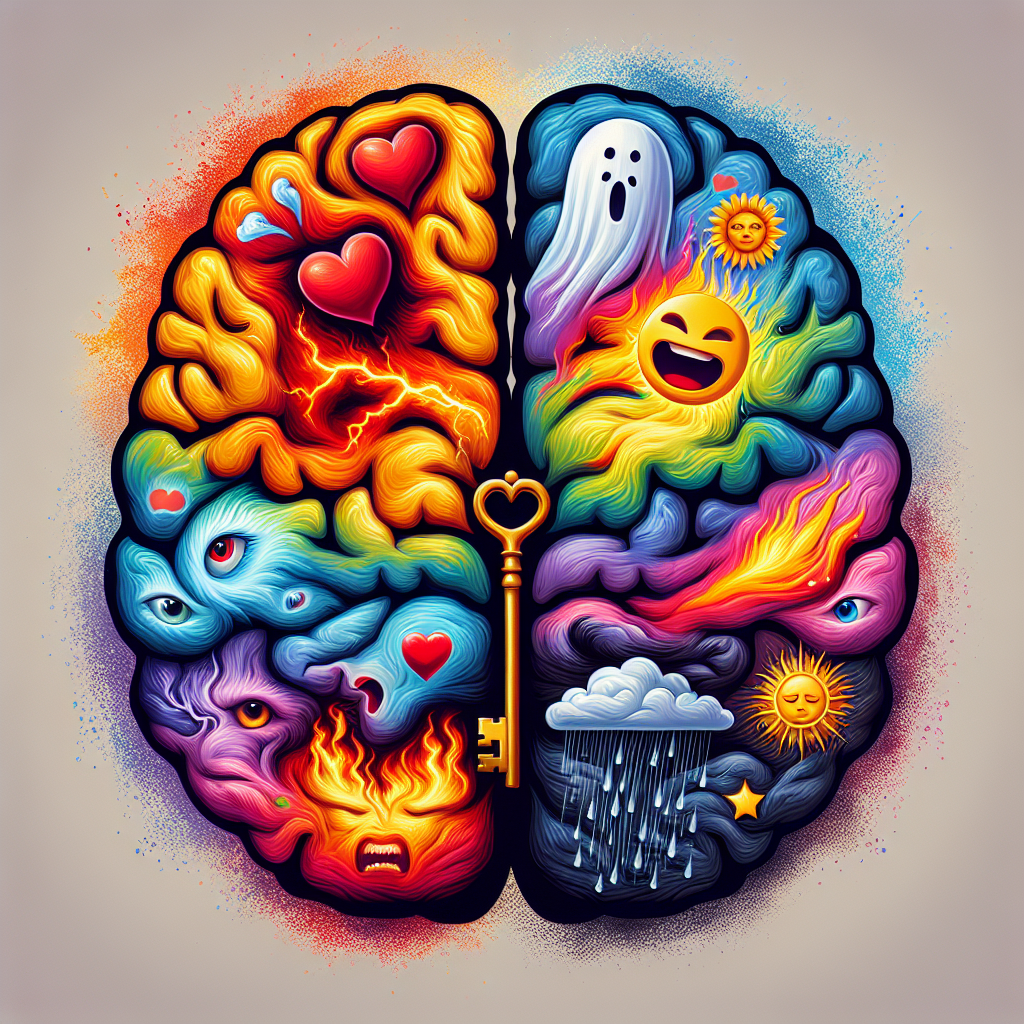Imagine a world where you had the power to control your emotions effortlessly, making decisions with clarity and peace of mind. In the search for this ultimate emotional superpower, scientists and psychologists have embarked on a quest to determine which emotion reigns supreme as the “master emotion.” Through extensive research and analysis, they aim to uncover the key to unlocking our emotional intelligence and inner serenity. Join us as we explore the fascinating journey to unravel the mystery of the master emotion, and discover how it holds the potential to transform our lives.
Defining Emotions
What are emotions?
Emotions are psychological and physiological responses that occur in response to certain stimuli or situations. They are complex reactions that involve the mind and body, influencing our thoughts, behaviors, and overall well-being. Emotions can range from simple and basic to multifaceted and profound, encompassing a wide range of experiences and feelings.
Components of emotions
Emotions consist of several components that work together to create a holistic experience. The primary components of emotions include cognitive appraisal, physiological arousal, subjective experience, expressive behavior, and action tendencies. Cognitive appraisal involves the interpretation and evaluation of a situation, while physiological arousal refers to the bodily changes that occur in response to emotions. Subjective experience relates to the personal and internal experience of emotions, while expressive behavior involves outwardly displaying emotions. Lastly, action tendencies refer to the behavioral predispositions associated with specific emotions.
Understanding Emotions
Importance of emotions
Emotions play a crucial role in our lives as they help us navigate and understand the world around us. They provide valuable information about our environment, help us make decisions, and guide our actions. Emotions also contribute to our overall well-being and are fundamental to our human experience. Without emotions, our lives would lack depth, meaning, and connection.
How do emotions affect us?
Emotions have a significant impact on various aspects of our lives. They influence our perception, cognition, and behavior. Emotions can enhance or impair our memory, attention, and problem-solving abilities. They also affect our relationships, communication, and social interactions. Additionally, emotions influence our physical health, as prolonged negative emotions can lead to stress-related illnesses and weaken our immune system.
The evolutionary perspective on emotions
From an evolutionary standpoint, emotions have developed as adaptive responses that have helped humans survive and thrive. Emotions served as a way to alert individuals to important information in their environment, such as potential threats or opportunities for social bonding. Emotions allowed our ancestors to make quick decisions and respond effectively to various situations, increasing their chances of survival. Thus, emotions are deeply ingrained in our biology and have been crucial to human evolution.

Types of Emotions
Basic emotions
Basic emotions are fundamental and universal emotional experiences that are shared across cultures. These emotions include happiness, sadness, fear, anger, surprise, and disgust. Basic emotions are characterized by distinct facial expressions, physiological responses, and subjective experiences. They are innate and can be easily recognized and understood by people from different backgrounds.
Complex emotions
Complex emotions, also known as higher-order emotions, are more nuanced and require a higher level of cognitive processing. These emotions include guilt, shame, pride, envy, love, and gratitude. Complex emotions are often influenced by social and cultural factors and may vary across individuals and societies. They involve a combination of basic emotions and are shaped by personal experiences, beliefs, and values.
Primary emotions
Primary emotions are immediate and instinctive emotional reactions that occur in response to specific stimuli. They are considered to be the building blocks of emotions and serve as the foundation for more complex emotional experiences. Primary emotions are typically brief and intense and include emotions like joy, anger, fear, and sadness.
Secondary emotions
Secondary emotions arise from the combination or blending of primary emotions. They are more complex and reflect a deeper level of emotional experience. Secondary emotions can include emotions like jealousy, pride, shame, and anticipation. These emotions are often influenced by social and cultural factors and can vary in intensity and duration.
The Power of Positive Emotions
Benefits of positive emotions
Positive emotions have a profound impact on our overall well-being and mental health. They contribute to our happiness, life satisfaction, and resilience. Positive emotions also enhance our cognitive abilities, including creativity, problem-solving, and decision-making. They improve our relationships, increase our social connections, and promote a sense of belonging. Additionally, positive emotions have been linked to better physical health, reduced stress levels, and improved immune function.
The role of happiness
Happiness is a significant positive emotion that encompasses feelings of joy, contentment, and satisfaction. It is often associated with a sense of fulfillment and well-being. Happiness has numerous benefits, including improved mental and physical health, increased longevity, and enhanced productivity. Cultivating happiness involves practicing gratitude, nurturing positive relationships, and engaging in activities that bring joy and fulfillment.
The science behind positive emotions
Positive emotions have been extensively studied in the field of positive psychology, which focuses on understanding and promoting well-being. Research has shown that positive emotions broaden our thought-action repertoires, allowing us to think more creatively, be more open-minded, and explore new possibilities. Positive emotions also build psychological resources, such as resilience, optimism, and self-esteem, which help us cope with adversity and navigate life’s challenges.

The Impact of Negative Emotions
Understanding negative emotions
Negative emotions, such as sadness, anger, and fear, are an integral part of the human experience. They serve important functions, including signaling potential threats, alerting us to unmet needs, and motivating change. Negative emotions can arise from various sources, such as personal setbacks, conflict, or loss. They can also be influenced by individual differences, personality traits, and past experiences.
The dangers of negative emotions
While negative emotions are natural and necessary, prolonged or intense negative emotions can have detrimental effects on our well-being. Chronic stress, anxiety, and depression are often associated with ongoing negative emotional experiences. Negative emotions can impair our cognitive functioning, strain our relationships, and contribute to physical health problems. Therefore, it is essential to recognize and manage negative emotions effectively.
Managing and overcoming negative emotions
There are various strategies that can help in managing and overcoming negative emotions. Developing emotional awareness and mindfulness can help individuals recognize and acknowledge their emotions without judgment. Expressing emotions through healthy outlets, such as talking with a supportive friend or engaging in therapeutic activities, can provide relief and promote healing. Additionally, cultivating positive emotions and engaging in self-care practices, such as exercise, relaxation techniques, and positive self-talk, can help regulate negative emotions and build psychological resilience.
The Role of Fear
Definition and characteristics of fear
Fear is a powerful and primal emotion that is activated in response to perceived threats or danger. It is an innate survival mechanism that prepares the body for a “fight or flight” response. Fear is typically accompanied by physiological changes, such as increased heart rate, rapid breathing, and heightened alertness. It can also elicit subjective experiences of anxiety, dread, and a sense of impending harm.
The purpose of fear
Fear serves a crucial evolutionary purpose by keeping us safe and protecting us from potential harm. It alerts us to danger and mobilizes our body to respond quickly and effectively. Fear helps us assess risks, make appropriate decisions, and take necessary precautions. Without fear, humans would be more vulnerable to physical and psychological threats, compromising their survival and well-being.
The physiological response to fear
When experiencing fear, the body undergoes a range of physiological responses known as the “fight or flight” response. These responses include increased heart rate and blood pressure, dilation of the pupils, enhanced sensory perception, and activation of the stress hormone cortisol. These physical changes prepare the body to either confront the threat or escape from it. The physiological response to fear is automatic and occurs within milliseconds, ensuring a rapid response to potential danger.
Managing and coping with fear
While fear is essential for survival, excessive or irrational fear can interfere with daily functioning and well-being. Managing and coping with fear involves developing resilience and learning strategies to regulate fear responses. Techniques such as deep breathing, progressive muscle relaxation, and cognitive reframing can help individuals reduce fear and anxiety. Seeking support from trusted individuals or mental health professionals can also provide guidance and tools for effectively managing fear.

Exploring Anger
Understanding anger
Anger is a powerful and intense emotion that arises in response to perceived injustice, frustration, or threat. It is often accompanied by feelings of indignation, irritability, and a desire to express or release pent-up energy. Anger can be expressed in various ways, ranging from mild annoyance to intense rage. It is a normal and natural emotion that serves as a signal that boundaries have been crossed or needs have been unmet.
Causes and triggers of anger
Anger can be triggered by a variety of factors, including interpersonal conflicts, frustration, perceived disrespect, injustice, or perceived threats to one’s safety or well-being. It can also arise from internal sources, such as self-criticism or feelings of inadequacy. Understanding the underlying causes and triggers of anger can help individuals identify and address the root causes of their anger in a constructive manner.
The effects of anger on health and relationships
While anger is a natural emotion, chronic or uncontrolled anger can have detrimental effects on both physical and mental health. Prolonged anger can lead to increased heart rate, elevated blood pressure, and compromised immune function. It can also strain relationships, causing conflict and distance. Unresolved anger can contribute to stress, anxiety, and even contribute to the development of mood disorders.
Anger management techniques
Anger management techniques help individuals regulate and express their anger in healthy and constructive ways. These techniques involve developing emotional awareness, recognizing triggers, and utilizing coping strategies. Deep breathing, counting to ten, and engaging in physical activity are practical ways to manage anger in the moment. Seeking therapy or anger management programs can also provide individuals with tools and strategies to effectively manage and express their anger.
Joy and Its Significance
The nature of joy
Joy is a positive emotion that is characterized by feelings of happiness, delight, and enthusiasm. It is a state of inner contentment and satisfaction that arises from experiencing something pleasurable or meaningful. Joy is often associated with positive events, such as accomplishments, celebrations, or spending time with loved ones. It is an uplifting emotion that brings a sense of fulfillment and well-being.
The impact of joy on well-being
Experiencing joy has numerous benefits for our well-being and mental health. Joy enhances our overall happiness and life satisfaction. It promotes positive thinking, optimism, and resilience. Joy strengthens our social connections and deepens our relationships, fostering a sense of belonging and support. It can also improve our physical health by reducing stress, boosting immune function, and promoting a healthy cardiovascular system.
Cultivating joy in everyday life
Cultivating joy involves actively seeking out and embracing experiences that bring us pleasure and happiness. Engaging in activities that align with our passions, hobbies, and interests can foster joy and fulfillment. Practicing gratitude and mindfulness can also enhance our ability to appreciate joyful moments and savor positive experiences. Finding joy in simple pleasures, connecting with others, and prioritizing self-care are all practical ways to nurture joy in our daily lives.

The Complex Emotion of Love
Defining love
Love is a complex and multifaceted emotion that encompasses a range of feelings, behaviors, and experiences. It is often described as a deep affection, attachment, or care for someone or something. Love can take many forms, including romantic love, familial love, platonic love, and self-love. It is a fundamental human emotion that is central to our relationships, well-being, and sense of fulfillment.
Different forms of love
Love manifests in various forms and can be experienced differently depending on the context and individuals involved. Romantic love involves feelings of passion, desire, and intimacy between two individuals. Familial love refers to the bond between family members, characterized by unconditional care and support. Platonic love is a deep friendship or connection based on mutual respect and admiration. Self-love involves having a positive and nurturing relationship with oneself.
The neurological basis of love
Love has been studied extensively from a neurological standpoint, revealing that it involves complex neural networks and chemical processes in the brain. The brain releases neurotransmitters, such as dopamine and oxytocin, which contribute to feelings of pleasure, attachment, and bonding. These chemical reactions play a crucial role in forming and sustaining loving relationships.
The role of love in relationships
Love is a vital ingredient in maintaining healthy and fulfilling relationships. It promotes emotional intimacy, trust, and mutual respect. Love enhances communication, empathy, and understanding between individuals. It fosters commitment and the desire to support and care for one another. Love also contributes to personal growth and self-discovery within the context of relationships.
Conclusion
Recognizing the power of emotions
Emotions are an essential aspect of the human experience, shaping our thoughts, behaviors, and overall well-being. Understanding and acknowledging the power of emotions can help us navigate life’s challenges, make informed decisions, and foster healthy relationships.
Finding balance and emotional well-being
Emotional well-being involves finding a balance between experiencing and expressing a range of emotions. It is important to recognize and embrace both positive and negative emotions, allowing ourselves to fully experience and learn from each emotional state. Engaging in self-care practices, seeking support when needed, and cultivating positive emotions can contribute to emotional well-being and a greater sense of fulfillment in life. Remember that emotions are natural and normal, and honoring and understanding them can lead to a more enriching and meaningful existence.


